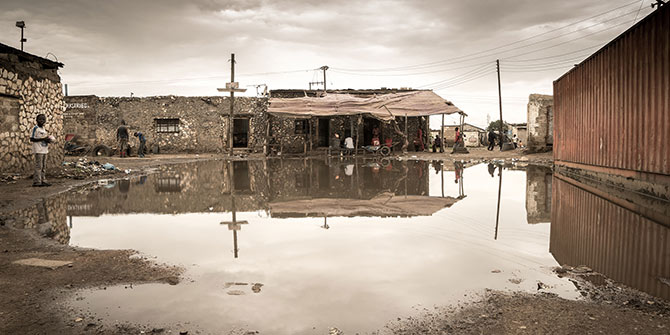Anna Macdonald and Holly Porter explore issues of justice, accountability and social repair in the context of post-conflict northern Uganda
This article is part of our #LSEReturn series, exploring themes around Displacement and Return.
Firoz Lalji Centre for Africa researchers Dr Anna Macdonald and Dr Holly Porter have contributed chapters to a recently published edited collection Pursuing Justice in Africa: Competing Imaginaries and Contested Practices (ed.) Jessica Johnson and George Hamandishe Karekwaivanane (Ohio University Press). Their contributions present findings and analysis from two research projects hosted in the Africa Centre: Politics of Return and Trajectories of Displacement. Both Macdonald and Porter examine broad questions of justice, accountability and social repair in the context of post-conflict northern Uganda.
Macdonald’s contribution Transitional Justice and Ordinary Justice in post-Conflict Acholiland critically examines global discourses and practices of transitional justice, and how these have been understood, re-shaped and experienced in the aftermath of the 20-year war between the Lord’s Resistance Army (LRA) and the Government of Uganda (GoU). The chapter is guided by three concerns: the first is to critique over-simplistic depictions of Acholi ‘perceptions’ of transitional justice that continue to dominate debate; the second is to uncover the stark dissonances between normative ideas linked to transitional justice efforts in Acholiland and the local realities of post-conflict life (also discussed in the March 2017 issue of Development and Change; and the third – given that transitional justice is rarely experienced in daily lives – is to explore and explain these dissonances more fully through an examination of ‘actually existing’ justice provision in the current Acholi context. She finds that past and current transitional justice approaches tend to analyse any given situation far too myopically, using a set of binaries – for example, local versus international justice or retributive versus restorative justice – that quickly collapse under empirical scrutiny. In Acholiland these conceptual divisions do not adequately take account of the substantive complexity of the justice choices people make or the hybrid nature of the authorities that are called on to adjudicate. In her examination of post-conflict land disputes for example, it becomes clear that the highly contingent nature of people’s decisions about where and how to seek resolution are not based on the norms espoused in transitional justice debates but rather on the most pragmatic and effective means by which to restore balance and meaning to post-conflict social relations.

Porter contributes a great deal to our understanding of this dynamic through her concept of ‘social harmony’ in the Acholi context. In “Home People” and “People of Human Rights”: Understanding Responses to Rape in Northern Uganda, she reflects on why so many women never access justice or take advantage of available services after rape in northern Uganda. Taking both relatives (home people) and NGOs (the people of human rights) in turn, the chapter looks first at practical ways they were – or were not – involved after the specific situations of rape in her research. Secondly, it examines how NGOs and relatives have influenced notions of rape, appropriate sexual behaviour, and responses to crime. This examination of their roles in shaping moral imaginaries and as practical actors after crime perpetrated by civilians and combatants alike contributes to a more grounded understanding for scholars and practitioners in the fields of gender-based violence, access to justice, and transitional justice.
Porter finds that relatives continue to play both the most practical and most common role in the aftermath of rape as well as exerting considerable influence on notions of rape and redress. The chapter explores several dynamics of relatives’ roles. First, women have situated freedom within a social system that highly values social harmony. The tendency within such a system is to deal with the situation expeditiously. This can takes a variety of forms, depending on the perceived threat of the crime or wrongdoing to social harmony. Secondly, the context for acceptable and unacceptable violence against women is highly impacted by communal exchange of customary payments and bride wealth. Lastly, the strength of the kinship system (patrilineal and patrilocal), which is widely held as “ideal” has been weakened by the confluence of changes ignited by war and modernisation. What this has meant for women has been mixed. It has created more space for individual freedom and understanding of rights. However, it also means that the most formidable actor’s authority has been eroded. They are therefore less able to provide the social protection they should according to Acholi “ideals”.
In terms of NGOs, the chapter identifies several of the dynamics of NGOs’ roles after sexual violence. Despite the fact that the majority of women said that they trusted NGOs to help them and many said they would turn to an NGO for help after sexual violence, Porter found that only four actually did and just two of those felt they were helped in a meaningful way. Women’s experiences point to two main contributors to this state of affairs. Many women, especially in rural areas are unaware of how or if NGO services are relevant to their needs and situation—and indeed, there is a question of relevance and approach. Services that NGOs supported, eg health services, tended to focus on sexual violence from a stranger and not the overwhelmingly more common forms of sexual violence such as intimate partner violence. NGO programs also tend to target women as individuals in their gender-based violence response programs. They emphasise “confidentiality” and offer services that are medical, psychological, and legal to individual women—some of these services are most relevant for the least common experiences of sexual violence. NGOs tend to respond within frameworks of global best practices, a focus on individual needs and have the supremacy of human rights as a driving factor. Yet decisions surrounding how to respond to wrongdoing are often made within the context of extended family structures and tend to have considerations for the impact on social harmony as a driving factor.
In the final analysis then the “home people” and not “the people of human rights” continue to play the most significant role in determining responses to rape.
As both Porter and Macdonald point out, in Acholi, there is no word for “justice”. “Ngol Matir” is the most common translation and it literally means to ‘cut straight’, to ‘decide a question,’ or to ‘determine a way forward’. Whether it is war crimes and crimes against humanity or related and unrelated sexual violence, this raises important questions about the prevailing priorities in the search for redress, accountability and social repair. Both chapters seek to address these questions.
Find out more about the Politics of Return and our Trajectories of Displacement research projects, which are based at the Firoz Lalji Centre for Africa and funded by ESRC/AHRC.
Dr Anna Macdonald is a Visiting Research Fellow at the Firoz Lalji Centre for Africa and Lecturer in International Development at the University of East Anglia.
Dr Holly Porter is Research Fellow at the Firoz Lalji Centre for Africa and a FWO [PEGASUS]2 Marie Skłodowska-Curie Fellow with the Institute of Development Policy (University of Antwerp) and the Conflict Research Group (Ghent University).
The views expressed in this post are those of the author and in no way reflect those of the Africa at LSE blog, the Firoz Lalji Centre for Africa or the London School of Economics and Political Science.





